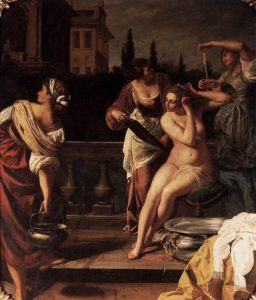Wherefore the Lord said unto Solomon, Forasmuch as this is done of thee, and thou hast not kept my covenant and my statutes, which I have commanded thee, I will surely rend the kingdom from thee, and will give it to thy servant.
surely rend the kingdom from thee, and will give it to thy servant.
– 1 Kings, 11:11
Solomon, the famously wise king of Judah, proved less than wise in dealing with his own carnal appetites. The favored son of the heroic King David, Solomon took the throne of Judah (a kingdom in the southern portion of present-day Israel) around 971 B.C. and ruled wisely and well for forty years. Stories abound of his sagacity in dealing out justice to his subjects, like the one about the two women who both claimed to be the mother of the same baby. Solomon ordered that the baby be cut in two, knowing that the real mother would beg him to give the child to the other woman rather than see the baby treated that way. He is also justly famous for ordering and overseeing the construction of the great temple that bore his name in Jerusalem.

17th century painter Artemisia Gentileschi’s take on the first time King David saw Bathsheba. According to the Bible, he saw her while her attendants were bathing her.
And yet Solomon himself was, according to the Bible, “born of sin.” Solomon’s father–the heroic King David–committed a terrible sin that was in many ways the very root of his future son’s existence. When the king first met Solomon’s future mother–the lovely Bathsheba–she was already married to one of his most trusted soldiers, a man known in the Bible as Uriah the Hittite. Consumed with passion for her, David seduced Bathsheba and got her pregnant, then arranged for Uriah’s death in battle–nothing short of murder. Bathsheba lost her baby (according to the prophet Nathan, as punishment for the sin she and David had committed together), but she and David had a second son after they were married. That was Solomon.
Then, of course, there’s the whole “sex-addiction” thing.
See, Solomon liked women. (Whether or not they liked him back is not recorded.) During his forty years on the throne, Solomon collected a harem that would have been the envy of any Turkish sultan. According to the Bible, he had an even 1,000 women at his disposal; 700 wives and 300 concubines. And the wives weren’t just any girls from off the street; they were princesses from neighboring countries married to Solomon by their fathers as part of any number of political alliances.
As if having that many women (plus the Queen of Sheba, whom he knocked up when she came to visit him) on the line didn’t make him bastard enough, Solomon’s harem proved to be a political headache. Not because there were 699 more wives and 300 more hookers in his household than might be socially acceptable, but because the wives, foreigners after all, had their own gods, and none of them was the god of the Israelites, who had so favored the fair-haired boy, Solomon.
Apparently it was only a matter of time before Solomon picked up so many of these bad, idolatrous habits, and displeased God. It was at that point that God told Solomon that he was going to break up his kingdom (in the quote at the opening of the chapter).
Some religious traditions hold that Solomon eventually saw the error of his ways, got rid of his idols (not sure about all those wives and concubines), and found redemption in the eyes of God. Muslims even hold that he never really fell away from his beliefs.
Pious bastard.

The Wailing Wall, center-to-right in this recent photograph, is all that remains of King Solomon’s famous temple in Jerusalem. In the distance lies the Dome of the Rock, which was built by Muslim caliphs over the spot from which Muslims believe the prophet Muhammed ascended to Heaven.
